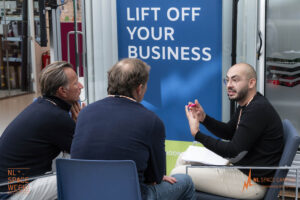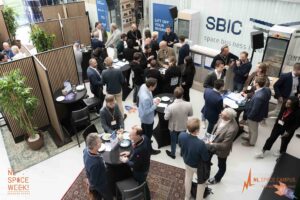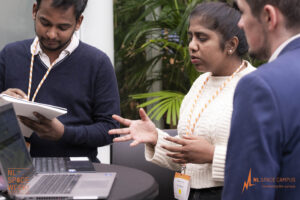
The space sector faces major challenges when it comes to funding. Developing innovative technologies is a costly process, and for many entrepreneurs, finding the right funding is often the biggest stumbling block. Especially in the so-called ‘Valley of Death’ phases, when development or growth costs exceed revenues, it is difficult to obtain the necessary funding. These phases are one of the biggest challenges for startups and scale-ups in the space sector. To support these entrepreneurs, Space Business Innovation Centre (SBIC) Noordwijk and NL Space Campus together with KplusV organised the Space Investor Event for the first time during NL Space Week 2024.
The challenge: Bridging the Valley of Death
For many space companies, finding funding is one of the biggest challenges. Entrepreneurs want to valorise and scale up their innovations, but often get stuck in the so-called ‘Valley of Death’. These are the stages where the cost of development or growth exceeds revenues. Many companies get stranded here, resulting in the loss of breakthrough innovations. Grants can sometimes help bridge these phases, but usually, equity is needed to continue growing and scaling up.

For companies in the growth phase, equity is often the only way to obtain the necessary funds. To prevent innovations from being stranded prematurely, SBIC and NL Space Campus offer help to startups and SMEs. The aim is to prepare entrepreneurs for investment so that they can further develop their innovations and achieve the commercial growth needed to achieve success.
The solution: The Space Investor Event
In October 2024, SBIC Noordwijk and NL Space Campus organised the Space Investor Event for the first time during NL Space Week. Here, we collaborated with the experienced consultancy firm KplusV. This first edition focused specifically on entrepreneurs with software innovations based on satellite data. In the preliminary process, we focused on helping these entrepreneurs get ‘investment ready’ so that they were well prepared for talks with investors.
During the event, participants had the opportunity to use the practical presentation tips and tricks in conversations with some of the financiers present. Fourteen investors were present, ranging from venture capitalists and informal investors to regional and national development companies and even a bank. These investors represent a wide range of financing options, which suit different life stages of a company.

The result: Successful connections between entrepreneurs and investors
The outcome of the Space Investor Event was more than promising. During the event, the 14 investors present met more than 20 space entrepreneurs from home and abroad. This mix of entrepreneurs, who were at different stages of their development, and investors created a dynamic and fruitful environment. Participants were able to get to know each other better in break-out sessions, where the entrepreneurs interacted with investors who might be interested in their projects.
These sessions were crucial, as they allowed entrepreneurs not only to present their business ideas but also to get direct feedback from investors. Initial contacts to fill funding rounds were made, and in the coming months, entrepreneurs and financiers will explore whether these conversations can lead to funding.

Future plans: Scaling up and developing further
The first edition of the Space Investor Event was a success and provides a solid foundation for the future. The event demonstrated that there is a clear need for a platform where space entrepreneurs and investors can meet. The success of this first event has therefore led to concrete plans to further expand the Space Investor Event.
NL Space Campus and the other organisers are working hard to scale up the event so that we can connect even more entrepreneurs and investors in the coming years. The ambition is to further develop and expand this platform to include space technology so that it continues to contribute to the growth of innovative companies in the space sector. Thanks to this event, we can not only increase the number of funding rounds for space companies but also ensure a sustainable ecosystem of investors in the space industry.
